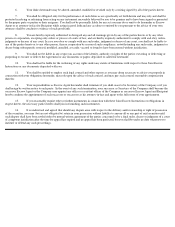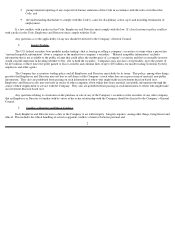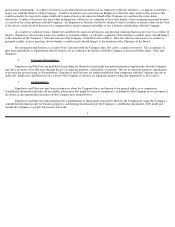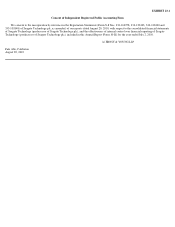Seagate 2009 Annual Report Download - page 237
Download and view the complete annual report
Please find page 237 of the 2009 Seagate annual report below. You can navigate through the pages in the report by either clicking on the pages listed below, or by using the keyword search tool below to find specific information within the annual report.-
 1
1 -
 2
2 -
 3
3 -
 4
4 -
 5
5 -
 6
6 -
 7
7 -
 8
8 -
 9
9 -
 10
10 -
 11
11 -
 12
12 -
 13
13 -
 14
14 -
 15
15 -
 16
16 -
 17
17 -
 18
18 -
 19
19 -
 20
20 -
 21
21 -
 22
22 -
 23
23 -
 24
24 -
 25
25 -
 26
26 -
 27
27 -
 28
28 -
 29
29 -
 30
30 -
 31
31 -
 32
32 -
 33
33 -
 34
34 -
 35
35 -
 36
36 -
 37
37 -
 38
38 -
 39
39 -
 40
40 -
 41
41 -
 42
42 -
 43
43 -
 44
44 -
 45
45 -
 46
46 -
 47
47 -
 48
48 -
 49
49 -
 50
50 -
 51
51 -
 52
52 -
 53
53 -
 54
54 -
 55
55 -
 56
56 -
 57
57 -
 58
58 -
 59
59 -
 60
60 -
 61
61 -
 62
62 -
 63
63 -
 64
64 -
 65
65 -
 66
66 -
 67
67 -
 68
68 -
 69
69 -
 70
70 -
 71
71 -
 72
72 -
 73
73 -
 74
74 -
 75
75 -
 76
76 -
 77
77 -
 78
78 -
 79
79 -
 80
80 -
 81
81 -
 82
82 -
 83
83 -
 84
84 -
 85
85 -
 86
86 -
 87
87 -
 88
88 -
 89
89 -
 90
90 -
 91
91 -
 92
92 -
 93
93 -
 94
94 -
 95
95 -
 96
96 -
 97
97 -
 98
98 -
 99
99 -
 100
100 -
 101
101 -
 102
102 -
 103
103 -
 104
104 -
 105
105 -
 106
106 -
 107
107 -
 108
108 -
 109
109 -
 110
110 -
 111
111 -
 112
112 -
 113
113 -
 114
114 -
 115
115 -
 116
116 -
 117
117 -
 118
118 -
 119
119 -
 120
120 -
 121
121 -
 122
122 -
 123
123 -
 124
124 -
 125
125 -
 126
126 -
 127
127 -
 128
128 -
 129
129 -
 130
130 -
 131
131 -
 132
132 -
 133
133 -
 134
134 -
 135
135 -
 136
136 -
 137
137 -
 138
138 -
 139
139 -
 140
140 -
 141
141 -
 142
142 -
 143
143 -
 144
144 -
 145
145 -
 146
146 -
 147
147 -
 148
148 -
 149
149 -
 150
150 -
 151
151 -
 152
152 -
 153
153 -
 154
154 -
 155
155 -
 156
156 -
 157
157 -
 158
158 -
 159
159 -
 160
160 -
 161
161 -
 162
162 -
 163
163 -
 164
164 -
 165
165 -
 166
166 -
 167
167 -
 168
168 -
 169
169 -
 170
170 -
 171
171 -
 172
172 -
 173
173 -
 174
174 -
 175
175 -
 176
176 -
 177
177 -
 178
178 -
 179
179 -
 180
180 -
 181
181 -
 182
182 -
 183
183 -
 184
184 -
 185
185 -
 186
186 -
 187
187 -
 188
188 -
 189
189 -
 190
190 -
 191
191 -
 192
192 -
 193
193 -
 194
194 -
 195
195 -
 196
196 -
 197
197 -
 198
198 -
 199
199 -
 200
200 -
 201
201 -
 202
202 -
 203
203 -
 204
204 -
 205
205 -
 206
206 -
 207
207 -
 208
208 -
 209
209 -
 210
210 -
 211
211 -
 212
212 -
 213
213 -
 214
214 -
 215
215 -
 216
216 -
 217
217 -
 218
218 -
 219
219 -
 220
220 -
 221
221 -
 222
222 -
 223
223 -
 224
224 -
 225
225 -
 226
226 -
 227
227 -
 228
228 -
 229
229 -
 230
230 -
 231
231 -
 232
232 -
 233
233 -
 234
234 -
 235
235 -
 236
236 -
 237
237 -
 238
238 -
 239
239 -
 240
240 -
 241
241 -
 242
242 -
 243
243 -
 244
244 -
 245
245 -
 246
246 -
 247
247 -
 248
248 -
 249
249 -
 250
250 -
 251
251 -
 252
252
 |
 |

•
prompt internal reporting of any suspected of known violations of this Code in accordance with the rules set forth in this
Code; and
•
the understanding that failure to comply with this Code is cause for disciplinary action, up to and including termination of
employment.
If a law conflicts with a policy in this Code, Employees and Directors must comply with the law. If a local custom or policy conflicts
with a policy in the Code, Employees and Directors must comply with the Code.
Any questions as to the applicability of any law should be directed to the Company’s General Counsel.
2. Insider Trading.
The U.S. federal securities laws prohibit insider trading—that is, buying or selling a company’s securities at a time when a person has
“material nonpublic information” about a company or the market for a company’s securities. “Material nonpublic information” includes
information that is not available to the public at large that could affect the market price of a company’s securities and that a reasonable investor
would consider important in deciding whether to buy, sell, or hold the securities. Companies may also face civil penalties, up to the greater of
$1.425 million, or three times the profit gained or losses avoided, and criminal fines of up to $25 million, for insider trading violations by their
employees and other agents.
The Company has a securities trading policy and all Employees and Directors must abide by its terms. This policy, among other things,
provides that Employees and Directors may not buy or sell shares of the Company’s stock when they are in possession of material, non-public
information. They also are prohibited from passing on such information to others who might make an investment decision based on it.
Employees and Directors also may not trade in stocks of other companies about which they learn material, non-public information through the
course of their employment or service with the Company. They also are prohibited from passing on such information to others who might make
an investment decision based on it.
Any questions relating to constraints on the purchase or sale of any of the Company’s securities or the securities of any other company
that an Employee or Director is familiar with by virtue of his or her relationship with the Company should be directed to the Company’s General
Counsel.
3. Conflicts of Interest and Ethical Conduct.
Each Employee and Director owes a duty to the Company to act with integrity. Integrity requires, among other things, being honest and
ethical. This includes the ethical handling of actual or apparent conflicts of interest between personal and
2
